How to Air Seal a House
Air sealing your home is a cost effective way of improving energy efficiency and comfort because it decreases the amount of air that enters or escapes out of your home. According to Energy Star, homeowners can save up to 20 percent on heating and cooling costs by air sealing their homes.
Before you air seal your house
Prior to air sealing, you should:
- Inspect for air leaks – You probably know where the obvious air leaks are, but to properly air seal your home, you’ll also need to locate the least obvious air leaks. Hiring an HVAC professional to conduct an energy assessment of your home can provide you with a complete inspection of your home for air leaks.
- Determine your ventilation needs for indoor air quality – Proper ventilation is important for an energy efficient home. Good ventilation helps control moisture to prevent mold growth and structural damage. A qualified HVAC professional can determine the level of ventilation that will improve your home’s indoor air quality.
How to air seal a house
There are three components to consider:
- Sealing leaks – Caulking, weatherstripping and spray foam are the most common approaches to sealing obvious air leaks such as around doors and windows. These methods may also be applied to hidden leaks in crawl spaces, attics and the basement.
- Add insulation – Properly insulating your home is important when air sealing your home. The recommended level of insulation in your attic is about 12 to 15 inches.
- Seal ducts – About 20 percent of the air moving through a home via its ductwork is lost because of leaks or improper sealing. An HVAC professional can repair your ducts with a duct sealant. Properly sealed ducts can keep your energy bills low and your home more comfortable.
To learn more about how to air seal your home, contact Cox Air Conditioning & Heating. For more than 50 years, we’ve proudly served the residents of the Clearwater, Palm Harbor, St. Petersburg, Tampa, Trinity and Westchase areas.
What Should Be on an Air Conditioning Preventive Maintenance Checklist?
In hot, humid climates like those in Clearwater, Florida, most people consider an air conditioner a necessity for comfort. People rarely think about their air conditioners until there is a malfunction. Regular maintenance ensures that heating and cooling systems work at optimum levels. A well-maintained unit needs fewer repairs and lasts longer. Since heating and cooling account for almost half of household fuel usage, keeping equipment in good working order helps save on utility bills by using less energy.
Preventive Maintenance Checklist
Seasonal check-ups for furnaces and air conditioners are recommended by most manufacturers as part of the conditions of warranty coverage. Regular tune-ups keep a unit running efficiently. What should be done as part of a preventive maintenance program for air conditioners? The checklist below explains what should be included:
- Check and balance refrigerant levels. Coolant that is too high or too low affects efficiency. A reduction in coolant levels of even 10 percent can increase operating costs by 20 percent.
- Clean or replace air filter. Dirty air filters are the primary cause of breakdowns that require air conditioning repair. Dirty air filters make a unit work harder and affect indoor air quality. Airborne particulates are re-circulated through the system and blown into the air you breathe.
- Clean, level and calibrate thermostat. Energy usage increases by 8 percent for each degree a thermostat is lowered. Dirt in the housing affects temperature readings. A thermostat that has been bumped and loses its level also affects calibration.
- Inspect and clean condenser and evaporator coils. Dirty coils reduce energy efficiency and make the compressor run longer.
- Inspect wiring and connections. Frayed wiring is a fire hazard. Improper connections affect voltage and flow of current, which can damage a unit.
- Make sure the unit cycles on and off properly. The system should turn on, run through a full cycle and shut off properly.
- Clean compressor housing. Leaves, dirt and debris affect air flow. If the compressor is in full sun, plant shrubs nearby, not closer than 3 feet, to provide shade.
- Check and clean drains and tubing. Clogged drains keep moisture from leaving the system. Water can back up and damage not only the unit but nearby structural elements of the building. Excess water in the system affects indoor humidity.
- Oil all moving parts. Sluggish fans and motors make a unit work harder.
- Check blower and grilles to ensure that air moves freely. Restricted airflow can reduce efficiency by up to 15 percent.
About Cox Air Conditioning and Heating
Cox Air has served Clearwater FL, Pinellas County and nearby areas since 1958. We are a Carrier Factory Authorized Dealer, which means we follow Carrier’s best business practices and guarantee 100 percent customer satisfaction. Our technicians are certified by North American Technician Excellence (NATE), the industry leader in HVAC and refrigeration technician certification.
We also offer:
- 24-hour emergency service for heating and air conditioning repair
- Residential and commercial installation, service and repair
- Service for all brands and models of HVAC equipment
- Annual maintenance agreements
- Saturday service from 7 a.m. to 7 p.m.
- Attractive financing
HVAC Maintenance Checklist to Follow This Winter
Owning a home in Florida means enjoying fantastic weather year-round. Even the few chilly days during winter don’t get you down. Along with great weather comes the need for HVAC maintenance. You might think summer is the main season for maintenance but even during the winter you’ll want your system running in tip-top shape. Here’s the checklist we recommend for winter HVAC maintenance.
Tips for Preparing Your AC Unit for Fall
Now that summer is officially over, there’s no better time to begin preparing your home for the fall and winter months. In addition to cleaning your gutters and patching up any air leaks, you’ll want to get your AC unit ready for the next season before it gets chillier outside. Here are some steps you can take to maintain your unit’s condition as the temperature begins to change.
The Checklist for Spring AC Maintenance
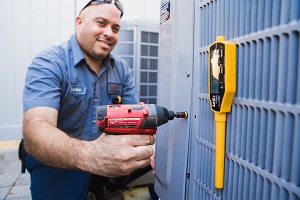
How to Avoid Letting AC Affect Your Health
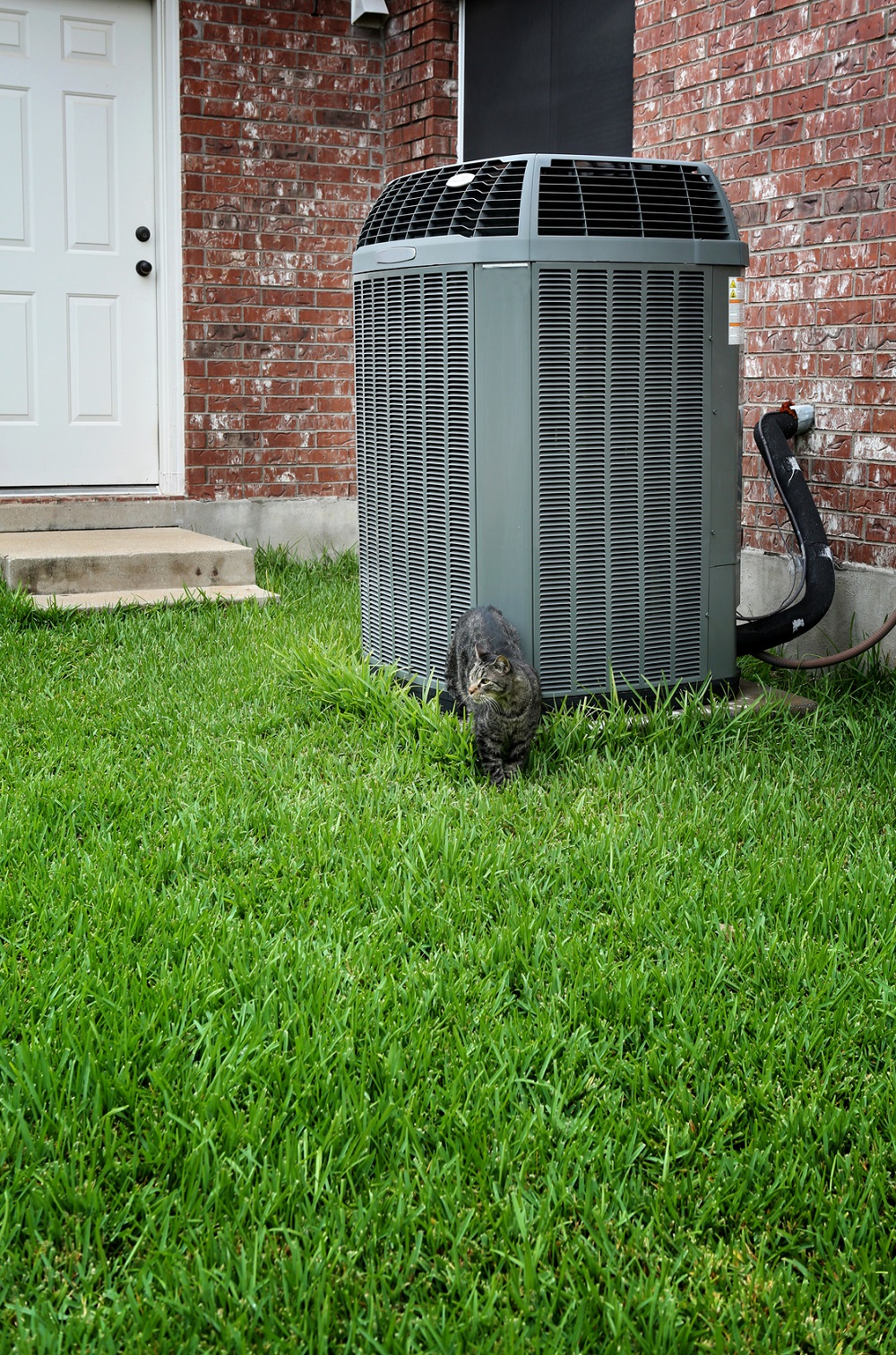
3 Reasons Why It’s Important to Clean Your AC Ducts
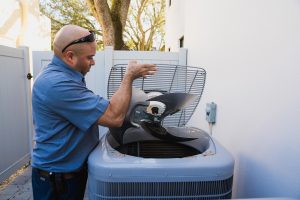
The Benefits of UV Lights to Your HVAC System
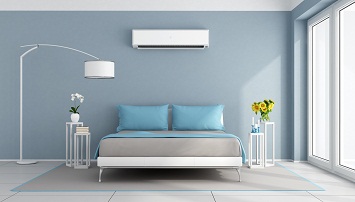
Better Airflow
Did you know that this technology, specifically ultraviolet-C (UV-C) has been used in heating and cooling systems for over 20 years? In the mid-1990s, UV lamps were marketed and promoted by health experts as a way to improve indoor air quality. However, that’s not all it does, and many homeowners don’t grasp the full benefits. One such benefit is improving air flow by preventing microbial buildup within the many components of the HVAC system. These parts include drain pas, air filters, duct surfaces, and cooling coils. Keeping these parts free of buildup goes a long way toward maintaining your system so it always works like new.
Improving air flow also means reducing maintenance costs for homeowners. When HVAC systems have to work harder, they tend to breakdown sooner. They become less efficient and homeowners notice it when their utility bills are higher, and they have to call for repairs more often.
More Energy-Efficient
What would your reaction be if you were told you could improve your home’s overall energy usage by as much as 35%? How would you feel if you knew you could do this using your existing HVAC system? Installing a UV device makes this happen. Not only does the device conserve energy, it rejuvenates existing HVAC systems’ performances to levels seen during the first year of operation. It achieves this by reducing power consumption and creating less wear and tear on the unit.
Disease Prevention
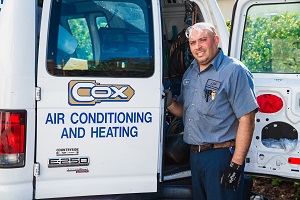
Cost-Effective
The price you pay to install UV lighting pays for itself in the following ways:
- Fewer repair bills because of overworked HVAC systems
- Less trips to the doctor and money spent on cold medicine because of respiratory illnesses
- Reduced energy costs
While the benefits of adding UV lighting to your HVAC system is something to seriously consider, it’s important to remember that you still need to maintain your heating and cooling system. Adhering to a regular maintenance schedule with a local HVAC company give you the most bang for your buck. It protects your investment and ensures that you have long-lasting heating and cooling service without unexpected interruptions.
To learn more about UV lighting, contact your local HVAC company and let the experts guide you toward the best decision for your home.
5 Reasons to Prep Your HVAC for Spring Now
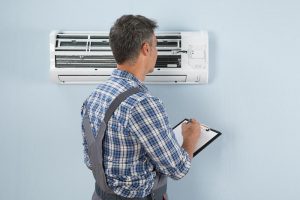
Here are five great reasons to prepare your HVAC for spring and the sunny summer months ahead.
1. A Healthier Home
Air ducts contaminated with dirt, dust or other materials can cause health problems for people who live in your home. A cleaning after the winter months can clear up any potentially hazardous materials as well as confirm your HVAC system did not suffer any damage during the winter months. If anyone in your home is prone to allergies, it’s even more important to schedule a regular cleaning of your HVAC system.
2. Improved Air Quality
Tuning up your HVAC for spring can not only protect your family’s health, but it can also improve your home’s overall indoor air quality. Having your HVAC serviced will confirm whether there are any problems with filtration, humidification and dehumidification, as well as proper ventilation. It’s important to have your indoor air quality tested to make sure your HVAC system has no leaks and that it provides fresh and clean air throughout the year, and now might be the best time to consider installing an indoor air purifying system to ensure high-quality, clean air inside your home year round.
3. Lower Utility Bills
Along with improving your air quality, a spring tune-up for your HVAC system may also result in lower monthly utility bills. Spring HVAC servicing will ensure there’s no dust on your indoor coils, breakage or leak in your ducts or layers of dirt on your outside coils. This tune-up can also confirm whether the system is low on refrigerant. Everyone loves saving money on energy bills!
4. Prevent Potential Breakdowns
No one wants to think of their HVAC system breaking down, especially during a hot Florida summer. When you schedule a tune-up, the team can ensure your HVAC system is prepared for the warm season and address any potential problems. Remember, summer heat is rough on your HVAC system, and it’s good to be prepared.
5. Extend Your System’s Lifespan
Having your HVAC system examined and serviced on a regular basis may extend its lifespan. In turn, that will save you from costly repairs. Routine maintenance can prevent small problems from becoming major headaches.
With the winter months coming to an end and the warm weather of spring upon us, there’s no better time to schedule a tune-up for your HVAC system. Whether for health reasons or simply to lower your monthly utility bill, investing in your home’s heating and cooling system is always a good idea. Contact the professionals at Cox Heating & Air Conditioning today and let us prepare your HVAC for spring and the long summer ahead.
Green HVAC Systems: Why You May Want a More Efficient and Environmentally Friendly HVAC System
Did you know that your HVAC system drains more energy dollars than any other system in your home? Considering that the average American household spends at least $2,000 a year on energy bills, according to the U.S. Department of Energy, there’s a lot of room for potential savings when you perform energy-conscious upgrades like green HVAC installation. Here are a few reasons why you may want to make the switch to a more efficient and environmentally friendly HVAC system.
Better for the Environment
Exchanging traditional HVAC systems for Energy Star qualified heating and cooling units can have a positive effect on environment. They use significantly less power than conventional systems, which translates to a reduction in greenhouse gas emissions. Energy Star certified HVAC systems and equipment must meet strict specifications set by the Environmental Protection Agency to ensure that they reduce environmental impact.
Save Money
HVAC installation of a high-performing system can result in hundreds of dollars in savings per year. If you choose an Energy Star certified system, you not only save 445 kWh per year of energy and 685 pounds per year in CO2 emissions, you also enjoy up to $717 in lifetime savings for an average product lifespan of 14 years, according to The Home Depot. By installing a greener, more efficient HVAC system, you may also be eligible for local tax credits, rebates or energy efficiency financing.
Safer, More Comfortable Home
Efficient HVAC systems should be felt and not heard. Typically, a noisy system indicates a lack of return airflow, meaning it has to work harder to pull more air through the ducts. An efficient system should run quietly. If there are rooms in your home that are consistently too hot or too cold or have humidity problems, then these are signs of an inefficient system. If you’re unsure whether or not your system needs replacement, the EPA offers a Home Energy “Yardstick” to compare your household’s energy use to others across the country.
A quality HVAC system can also mean a safer home with improved indoor air quality as a result of better humidity control and more efficient air ventilation and purification.
Customize for Best Performance
High humidity can result in condensation damage and poor air quality. Energy efficient HVAC systems often allow homeowners to set the humidity level for a customized approach to comfort. Look for a Seasonal Energy Efficiency Ratio (SEER) score of 13 to 17. SEER measures the cooling output of the system during a typical season divided by the total electric energy input during the same season, telling you how much energy is used to cool the home during warmer months. Most modern systems also work with a programmable thermostat, which can help homeowners save about $180 every year in energy costs, according to the EPA.
If your HVAC unit is old or inefficient, then it’s time to consider replacing it with an improved system. Cox Heating & Air Conditioning has a team of professionals that can handle your HVAC installation as well as help you repair or maintain the life of your existing system.



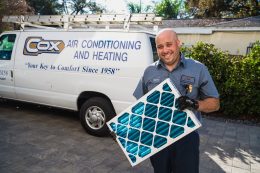

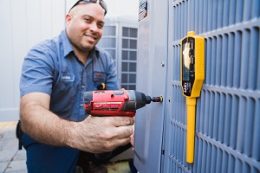
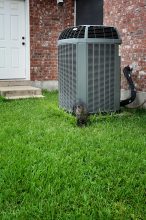
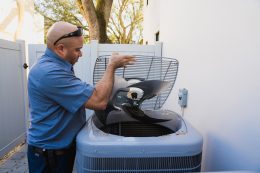

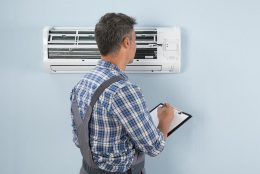



Recent Comments